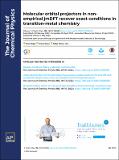Molecular orbital projectors in non-empirical jmDFT recover exact conditions in transition-metal chemistry
Author(s)
Bajaj, Akash; Duan, Chenru; Nandy, Aditya; Taylor, Michael G; Kulik, Heather J
DownloadPublished version (6.589Mb)
Publisher with Creative Commons License
Publisher with Creative Commons License
Creative Commons Attribution
Terms of use
Metadata
Show full item recordAbstract
<jats:p> Low-cost, non-empirical corrections to semi-local density functional theory are essential for accurately modeling transition-metal chemistry. Here, we demonstrate the judiciously modified density functional theory (jmDFT) approach with non-empirical U and J parameters obtained directly from frontier orbital energetics on a series of transition-metal complexes. We curate a set of nine representative Ti(III) and V(IV) d<jats:sup>1</jats:sup> transition-metal complexes and evaluate their flat-plane errors along the fractional spin and charge lines. We demonstrate that while jmDFT improves upon both DFT+U and semi-local DFT with the standard atomic orbital projectors (AOPs), it does so inefficiently. We rationalize these inefficiencies by quantifying hybridization in the relevant frontier orbitals. To overcome these limitations, we introduce a procedure for computing a molecular orbital projector (MOP) basis for use with jmDFT. We demonstrate this single set of d<jats:sup>1</jats:sup> MOPs to be suitable for nearly eliminating all energetic delocalization and static correlation errors. In all cases, MOP jmDFT outperforms AOP jmDFT, and it eliminates most flat-plane errors at non-empirical values. Unlike DFT+U or hybrid functionals, jmDFT nearly eliminates energetic delocalization and static correlation errors within a non-empirical framework. </jats:p>
Date issued
2022Department
Massachusetts Institute of Technology. Department of Chemical Engineering; Massachusetts Institute of Technology. Department of Chemistry; Massachusetts Institute of Technology. Department of Materials Science and EngineeringJournal
The Journal of Chemical Physics
Publisher
AIP Publishing
Citation
Bajaj, Akash, Duan, Chenru, Nandy, Aditya, Taylor, Michael G and Kulik, Heather J. 2022. "Molecular orbital projectors in non-empirical jmDFT recover exact conditions in transition-metal chemistry." The Journal of Chemical Physics, 156 (18).
Version: Final published version